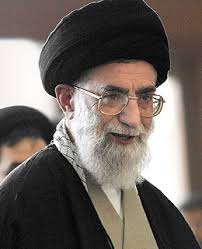 Iran's Supreme Leader Ayatollah Ali Khamenei said Saturday, "Of course, we have no prior experience of the new president of the American republic and of the government, and therefore we shall make our judgment based on his actions."
Iran's Supreme Leader Ayatollah Ali Khamenei said Saturday, "Of course, we have no prior experience of the new president of the American republic and of the government, and therefore we shall make our judgment based on his actions."
The US corporate media mysteriously interpreted Khamenei's words as a rebuff to Obama, but interestingly, the French news agency, Agence France Presse, got the story right, entitling their article, "Iran ready to change if US leads way: Khamenei."
And, the Iranian PressTV had an even more enthusiastic headline: "Iran vows response to real US change."
He said that the Iranian public would be offended if anyone addressed it with a discourse of carrots or sticks. That was when he immediately excused Obama from any such charge, saying the latter had a clean slate.
Elsewhere in the address he pledged, in AFP's translation, "If you change your attitude, we will change our attitude."
Iran's leader pointed out that the name of the US in the world at large is mud because of offensive US policies (he is probably thinking of wars of aggression, torture, etc.). He counsels that the US should change its behavior so that gradually its would gain the esteem of the world.
Khamenei did specify the practical steps the US might take to show it was in earnest.
- He implied that the US was behind Sunni terrorism against the regime in Iranian Baluchistan near the the Pakistani border (Baluch are Sunnis and tribal and dislike the Persian, Shiite government in Tehran. Some observers have accused the US of fomenting terrorism among such minorities, and Khamenei appears to accept the theory).
- He implicitly complained about continued US support for and use of the Iranian terrorist group, the Mojahedin-e Khalq (MEK), whose base in Iraq (given them by Saddam to harass Iran) the US continues to maintain and guard despite the Iraqi government's desire to close it down and expel the Mojahedin. The US State Department has declared the MEK a terrorist organization, but the Pentagon is said to still deploy its members for covert ops inside Iran. In these two points, which are allusive in the speech, he is essentially accusing the US of being a major sponsor of terrorism.
- He complained that the US continued to accuse Iran of sponsoring terrorism.
- He complained that the US continues to accuse Iran of trying to build a nuclear bomb. (Khamenei and all Iranian government officials strongly deny that charge, saying they only have a civilian research program for energy purposes; US intelligence assessments back Khamenei up on all this, but the Washington politicians still routinely speak of taking strong measures stopping Iran from getting the bomb. Khamenei views such talk as a threat of aggression and sees the nuclear issue as a mere pretext for US neo-imperialism. The US dominated Iran during and after WW II and made a pro-monarchy coup in 1953, saddling the country with a megalomaniac shah who was subservient to US interests, until the 1979 Islamic Revolution).
- He complained of continued US economic sanctions and boycotts.
- He complained of US support for Israel.





No comments:
Post a Comment